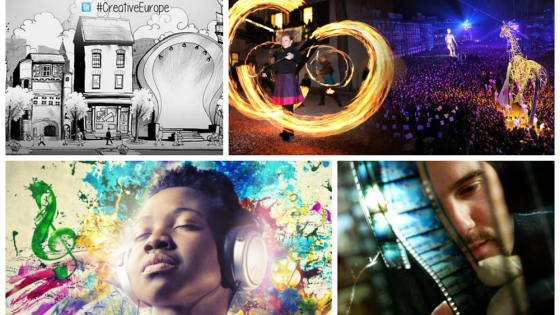The cultural and creative industries, including visual and performing arts, crafts, media, publishing, music and film, are increasingly recognized as underpinning local, national and regional economies and societies. Lying at the crossroads between the arts, business and technology, the creative industries can be defined as knowledge-based industries, creating employment and wealth. By nurturing creativity and fostering innovation, societies hope both to maintain cultural diversity and to enhance economic performance.
The creative industries represent a leading sector of the economy in the OECD countries, with annual growth rates between 5 and 20 percent in the past few years. In 2008, the cultural and creative sectors contributed an estimated 4.5 % to EU GDP, and employed some 3.8% of Europe's workforce. Beyond this direct contribution to jobs and growth, these sectors trigger spill-overs in other areas such as tourism and content for ICT, providing also benefits for education, social inclusion and social innovation. They are therefore particularly important, as Europe seeks to emerge from the current economic crisis. Acknowledging this, the European Commission has recently launched "Creative Europe", the new framework programme for the cultural and creative sectors for the 2014-2020 Multi-Annual Financial Framework (MFF), which proposes a significant increase of 37% in the budget devoted to these sectors.
Issues related to the cultural and creative sectors in Europe and their role in the European economy and society will be addressed during the two-day conference “Financing Creativity”, which will take place in the Athens Concert Hall on 20-21 February, 2014. The event is organized by the Ministry of Culture & Sports and is co-funded by the European Commission, within the Greek Presidency of the Council of the EU.
The Conference “Financing Creativity”, focuses on a distinctive interdisciplinary and critical understanding of culture and creativity, by exploring probing questions about cultural and creative industries, cultural management, cultural policy and all aspects of cultural life, from design, film, music and visual culture to youth subcultures, gaming and fashion. The main objective is to mark the new philosophy for the cultural and creative sector in Europe, to familiarize with the existing tools and expertise that can facilitate access to finance, to increase the capacity of the cultural sector to attract private finance and to highlight the commercial potential and opportunities of contemporary creation that can open up new opportunities for economic growth and employment, especially among young people. Furthermore, amongst the goals set by the Ministry of Culture and Sports is the promotion and support of cultural and creative industries as agents of economic and social development, in accordance to the objectives of the European strategy for smart, sustainable and inclusive growth “Europe 2020”.
The Commissioner of the EU for Education, Culture, Multilingualism and Youth, Androulla Vassiliou will give the opening speech of the Conference.








